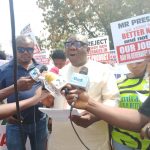State Policing in Nigeria: Between Necessity and National Risk
By Dr. Aiyeku Olufemi Samuel
The conversation around state policing has gained renewed momentum in Nigeria. With rising insecurity—banditry, kidnappings, farmer-herder clashes, insurgency, and armed robbery—many see decentralizing the police structure as a natural and necessary step. But the question remains: Is Nigeria ready for state policing, and at what cost?
Let’s begin with the obvious: Nigeria’s centralised policing system has failed to secure lives and property effectively. The Nigeria Police Force (NPF), with a workforce of approximately 370,000 officers, serves a population of over 220 million—well below the United Nations’ recommended police-to-citizen ratio of 1:450. Nigeria’s current ratio stands at roughly 1:600, and even then, a significant number of personnel are attached to VIPs or political elites rather than active field duty.
So, can state police bridge the gap? Possibly. A decentralized police force, rooted in the cultural and geographic contexts of individual states, could lead to quicker response times, community trust, and intelligence gathering. But at what price?
The Case For State Policing
Localized Intelligence and Quick Response: Security threats vary by region. What plagues Zamfara may not affect Ogun. A state-controlled force allows tailored approaches.
Community Integration: State police can build trust faster through local recruitment, language familiarity, and cultural sensitivity.
Employment and Economic Growth: State policing offers massive job creation, relieving youth unemployment and strengthening local economies.
Pressure Off the Federal Police: By handling local issues, state police allow the NPF to focus on national threats like terrorism, arms trafficking, and border security.
But Here Comes the Fear…
What happens when state policing is abused? In a country where political thuggery, ethnic bias, and impunity are still very much alive, the risk of misuse cannot be overstated.
Weaponization of Power: Governors could use state police to silence opposition, harass critics, or manipulate elections. What checks exist?
Inconsistent Standards: Without a unifying national benchmark, training, equipment, and discipline could vary dangerously between states.
Ethnic Bias & Human Rights Abuse: In a multi-ethnic society, the fear that local forces could discriminate or intimidate minorities is valid and must be addressed proactively.
Dual Loyalties and Clashes: Would federal and state police overlap or conflict in jurisdiction? How do we resolve inter-state pursuits and collaboration?
Rhetorical Questions We Must All Ask
Is the problem truly structural—or is it a matter of leadership and accountability within existing frameworks?
Can state policing function efficiently in states already struggling to pay minimum wage?
How do we ensure political neutrality and institutional independence?
Lessons from Others
Countries like the United States, Canada, and India operate multiple police layers. However, they have strong legal institutions, well-resourced states, and effective checks and balances. Nigeria’s reality is different. Insecurity persists not just because of structure—but due to corruption, poor coordination, inadequate training, and weak judicial support.
According to the Nigeria Security Tracker by the Council on Foreign Relations (2024), over 16,000 deaths from violent conflict were recorded in Nigeria within 12 months. In 2023 alone, over 4,000 people were kidnapped across the country. The Northwest and Northcentral regions saw the highest casualties from banditry and communal violence.
Strategic Path Forward
Rather than rush into full-scale state policing, Nigeria must consider:
A Gradual, Pilot Approach: Begin with regional security frameworks like Amotekun (Southwest) and Ebube Agu (Southeast), refine them with federal oversight.
Create a Policing Standardization Commission: Independent body to set training, conduct, and recruitment standards across states.
Establish Legal Safeguards: Ensure constitutional amendments clearly define the scope, funding, and accountability structure of state police.
Improve Federal Policing Simultaneously: State police is not a silver bullet. A reform of the NPF must happen in parallel.
Invest in Digital Policing Tools: Surveillance drones, community incident apps, national criminal databases, and intelligence-sharing platforms.
Final Thoughts
As Benjamin Franklin once said, “Those who would give up essential liberty to purchase a little temporary safety deserve neither liberty nor safety.” Nigeria must not sacrifice unity and justice in the name of localized protection.
State policing could be part of the solution—but only when implemented with foresight, equity, and an unwavering commitment to the rule of law. Otherwise, we risk trading one form of insecurity for another — from insurgents to political oppressors.
Nigeria’s journey to security must be deliberate, balanced, and people-centric. We don’t just need more police. We need better governance, justice, and leadership at every level.
#StatePolicingDebate #SecurityInNigeria #FederalismRealityCheck #JusticeNotJustPower #LeadershipMatters #TrueFederalism #DrAiyekuOlufemiSamuel












